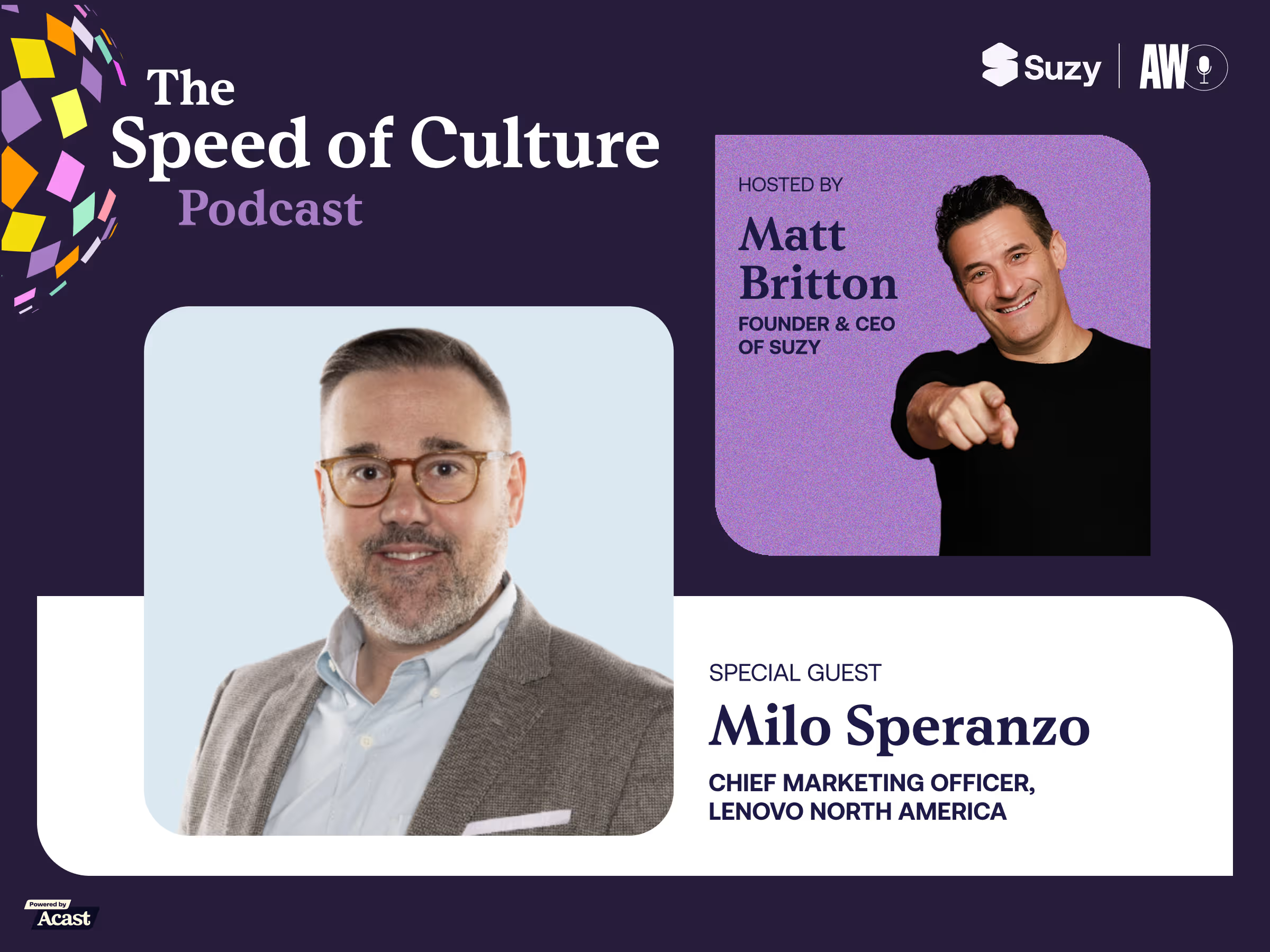By Cory McDonald, Senior Director, Sales, Suzy
On a recent grocery run my 16-month-old locked eyes on a cartoon-branded yogurt pouch. One insistent point, a squeal, and before I could reach our usual “grown-up” option the pouch was in the cart. At first I laughed, then I realized that a toddler had just redirected our household budget in under three seconds. Multiply that moment across millions of homes and the power of Generation Alpha comes into focus.
That single swap sparked the question every consumer brand should be asking in 2025: How do we win the hearts of kids who already sway what their parents buy? The answer starts with understanding the scale of the cohort and the mechanics of their influence and then tapping research tools that let you hear both voices in the buying conversation.
Gen Alpha at a glance
Generation Alpha, children born 2010-2025, will exceed 2 billion globally by year-end, making them the planet’s largest cohort. Raised with tablets and smart speakers from infancy, their expectations for choice, speed, and personalization eclipse anything Millennials faced at the same age.
Crucially, their influence isn’t deferred until adulthood. According to a 2025 L.E.K. Consulting survey of 2,000 parents, more than eight in ten parents say their Alpha children already shape spending on food, personal care, and entertainment. In other words, the voice coming from the car seat is now a decisive stakeholder in your quarterly sales.
How kids direct the household wallet
Parents still swipe the card, but Alphas set the shortlist. Research estimates their preferences rippled through nearly $1 trillion in global household purchases this past year. They influence everything from pantry staples to which streaming service earns a subscription.
Whether it’s a viral snack flavor or the water bottle a favorite creator unboxes, digital discovery turns quickly into real-world demand often in the exact aisle where parents thought they’d make the call.
A play-by-play of kid–parent negotiations
In practice, the decision process looks like this:
- Discovery – Children spot a product through YouTube Shorts, Roblox, or store end-caps
- Debate – Parents interrogate nutrition, price, or sustainability while kids champion taste, fun, or social proof
- Decision - after a negotiation, either the fun character packaging stays, or the high-sugar item goes, or compromise is reached to buy the kid-approved item plus something healthier to balance it out.
The dynamic is on vivid display in 2025’s breakout snack story: Samyang’s ultra-spicy Buldak ramen. After a single TikTok birthday video went viral, Samyang doubled U.S. retail doors within a year and became Gen Alpha’s top-ranked brand. The lesson: meet kids where they gather online and prepare operations to scale when they declare love.
Where campaigns still miss the mark
Too many kid-adjacent campaigns fall short because they’re built for parents alone. Long-form ESG claims and muted palettes reassure adults, but bore children who demand a spark of play or an identifiable mascot. Conversely, candy-bright creative without a credible nutrition win can trigger a hard veto from the cart-pusher.
Another common slip: brands rely on legacy “mom-only” personas that ignore how quickly a preschooler can kill a sale with a single “yuck.” Without real-time feedback from both decision-makers, marketers gamble on assumptions and hope packaging survives the aisle test.
How Suzy surfaces kid-driven insights—through the parent lens
Understanding Gen Alpha’s impact on purchases doesn’t have to mean talking directly to children. With Suzy Speaks, brands can invite parents to recount the exact “moment of influence”—what their child asked for, how they phrased it, and why the parent ultimately said yes or no. Because the conversations are voice-based, Suzy captures tone, pauses, and emotional cues that text surveys miss, giving you a clear read on the strength of a child’s nudge and the factors that still matter most to the adult holding the wallet.
Those rich narratives become even more actionable when paired with Dynamic Segmentation, which refreshes parent attitudes each season, and Drivers Analysis, which quantifies the trade-offs that actually boost purchase intent—whether that’s a lower-sugar claim, character packaging, or a sustainability badge. Together, the toolkit lets you fine-tune messaging and packaging for the household decision-maker while staying true to the sparks that kids create—iterating in days instead of months, all without crossing the legal lines that come with researching minors directly.
2025 action plan for consumer brands
Before your next product brief hits design, pause for two critical steps:
First, refresh your family personas. Treat Gen Alpha as an active co-decider, not a passive audience. Run a Suzy Speaks pulse to collect 100+ paired interviews and map the phrases kids use to lobby and the lines parents won’t cross.
Second, prototype with evidence. Feed Drivers Analysis results into rapid creative sprints: adjust flavor names, tweak character art, or simplify eco claims so a six-year-old can repeat them at dinner. Re-pulse quarterly; playground trends mutate fast, and a hero color in spring can feel dated by fall.
My toddler’s yogurt coup wasn’t a one-off; it was a preview of the purchasing future. Brands that learn to listen will earn trust that compounds into lifelong loyalty.
Want to hear Gen Alpha’s unfiltered feedback on your next launch? Book a 20-minute Suzy Speaks demo.
.webp)
.avif)






